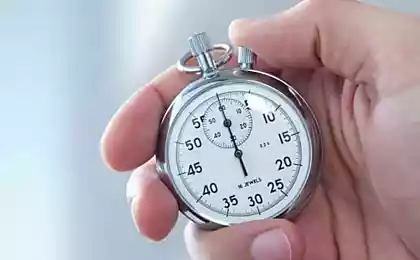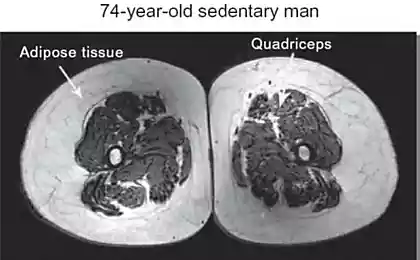905
How to eat during training
In today's world of sports for many people it has become a real way of life. Ardent supporters of an active lifestyle not only know all about physical activity, healthy eating and rules to be followed by each athlete.
However, many young athletes, but decided to do away with a sedentary lifestyle, are experiencing some difficulties, not knowing what diet during sporting loads, they should adhere to. If you consider yourself one of them, we collected tips about nutrition in sports, dispel all your doubts and help you achieve the perfect balance in your diet. However, even the professionals can benefit from the proposed material and discover something new.
Drink before you feel thirsty
Thirst - the first symptom of dehydration. By the time you feel it, your body has to lose 2-3% of the liquid. It already can adversely affect your endurance at high loads. Start preparing for training, drinking from 400 to 700 ml of water for 2 hours before training. During training recommended drink every 15-20 minutes from 150 to 350 ml of water or a sports drink. To fully restore water balance after school, in the next few hours, it is desirable to drink 450 to 600 ml of water or sports drink.
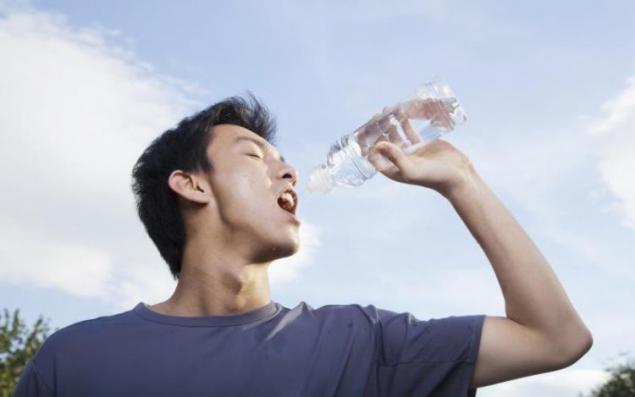
Fill carbohydrates
Carbohydrates are a major source of energy in the body. It is essential to the high content of carbohydrates in the diet for athletes and those who enjoy hiking or backpacking. When you do not consume enough carbohydrates, will go to the expense of muscle protein and stored fat. To avoid this and increase your endurance, consume 30 to 60 grams of carbohydrate (120-240 calories) for every hour of exercise. Several products with a high content of carbohydrates: dried fruit, sports drinks, energy bars and energy gels.
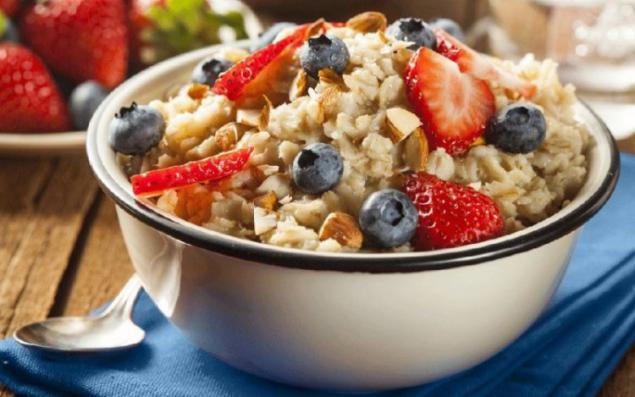
Eat your breakfast
Starting the day with a hearty breakfast, you will be great to improve their productivity. Your breakfast should be high in carbohydrates, low in fat and fiber, and some protein. Your goal is to get from 300 to 500 calories per morning meal. A good option for breakfast will be porridge with dried fruit, eggs and cheese sandwich or cereal with powdered milk or yogurt.

Eat every hour
During training your stomach, not peretruzhdayas, quite capable to digest food containing a few hundred calories. This amount would be enough to keep your energy at a constant level. If you decide to score his stomach to the eyeballs, your performance will drop much: all your energy to it is oriented to digest eaten you. Experiment with food - it is important to determine what kind of food your body will absorb the best during sports.
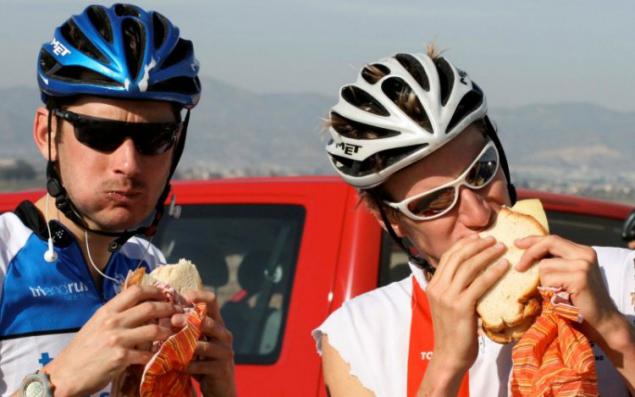
Recovers immediately after school
Within 30-45 minutes after exercise, your muscle tissue is particularly susceptible to the processes of regeneration and recovery. In your meal for that period should be 4: 1 ratio of carbohydrates to proteins. Carbohydrates make up for lost energy and protein provide the muscle cells damaged building blocks - amino acids. Options include beef jerky, granola or hard salami on a bun.
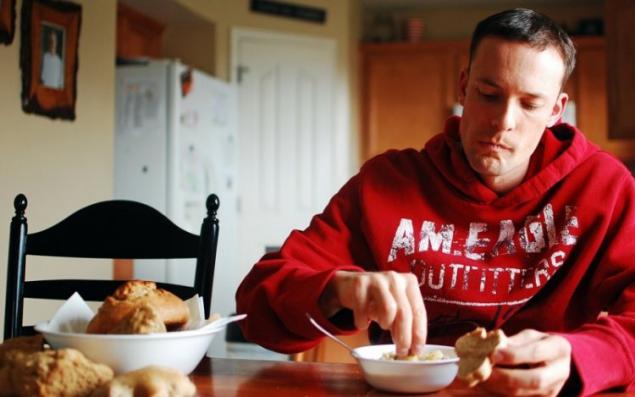
Do not forget the electrolytes
Reducing the amount of electrolytes in your tissues and blood may be as damaging as the dehydration. Consumption of large amounts of water without replenishing electrolytes can lead to hyponatremia - a condition in which your body is unable to function properly due to lack of salt. To avoid electrolytic imbalance, you need to keep the content of sodium, potassium, chlorine and magnesium constant. To do this, take a rule to the regular consumption of snacks like pretzels, salted nuts or potato chips.
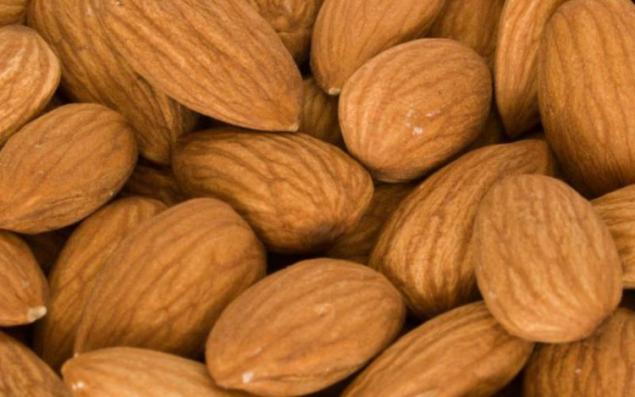
However, many young athletes, but decided to do away with a sedentary lifestyle, are experiencing some difficulties, not knowing what diet during sporting loads, they should adhere to. If you consider yourself one of them, we collected tips about nutrition in sports, dispel all your doubts and help you achieve the perfect balance in your diet. However, even the professionals can benefit from the proposed material and discover something new.
Drink before you feel thirsty
Thirst - the first symptom of dehydration. By the time you feel it, your body has to lose 2-3% of the liquid. It already can adversely affect your endurance at high loads. Start preparing for training, drinking from 400 to 700 ml of water for 2 hours before training. During training recommended drink every 15-20 minutes from 150 to 350 ml of water or a sports drink. To fully restore water balance after school, in the next few hours, it is desirable to drink 450 to 600 ml of water or sports drink.

Fill carbohydrates
Carbohydrates are a major source of energy in the body. It is essential to the high content of carbohydrates in the diet for athletes and those who enjoy hiking or backpacking. When you do not consume enough carbohydrates, will go to the expense of muscle protein and stored fat. To avoid this and increase your endurance, consume 30 to 60 grams of carbohydrate (120-240 calories) for every hour of exercise. Several products with a high content of carbohydrates: dried fruit, sports drinks, energy bars and energy gels.

Eat your breakfast
Starting the day with a hearty breakfast, you will be great to improve their productivity. Your breakfast should be high in carbohydrates, low in fat and fiber, and some protein. Your goal is to get from 300 to 500 calories per morning meal. A good option for breakfast will be porridge with dried fruit, eggs and cheese sandwich or cereal with powdered milk or yogurt.

Eat every hour
During training your stomach, not peretruzhdayas, quite capable to digest food containing a few hundred calories. This amount would be enough to keep your energy at a constant level. If you decide to score his stomach to the eyeballs, your performance will drop much: all your energy to it is oriented to digest eaten you. Experiment with food - it is important to determine what kind of food your body will absorb the best during sports.

Recovers immediately after school
Within 30-45 minutes after exercise, your muscle tissue is particularly susceptible to the processes of regeneration and recovery. In your meal for that period should be 4: 1 ratio of carbohydrates to proteins. Carbohydrates make up for lost energy and protein provide the muscle cells damaged building blocks - amino acids. Options include beef jerky, granola or hard salami on a bun.

Do not forget the electrolytes
Reducing the amount of electrolytes in your tissues and blood may be as damaging as the dehydration. Consumption of large amounts of water without replenishing electrolytes can lead to hyponatremia - a condition in which your body is unable to function properly due to lack of salt. To avoid electrolytic imbalance, you need to keep the content of sodium, potassium, chlorine and magnesium constant. To do this, take a rule to the regular consumption of snacks like pretzels, salted nuts or potato chips.









